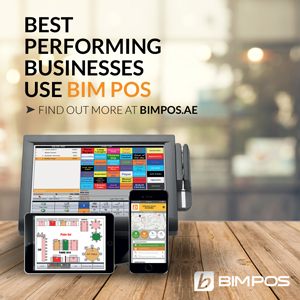The 4th Middle East Food Forum was held at the Festival City Arena Exhibition Centre from 27th – 29th April, 2019 drawing attention and participation of distinguished industry leaders. From restaurant consultants to chefs, owners to operators, and social media influencers to food critics, the forum served as a perfect melting pot of knowledge, coupled with skills and expertise. The three-day event comprised of fifteen panels, 6 keynote speakers who took the stage to share the current landscape of the food and beverage industry, several crippling challenges facing the industry, along with great advice for businesses to grow and thrive. To set the tone of the event, the welcome speech was delivered by Vishal Pandey, Founder (Middle East Food Forum).
The first Keynote speaker, Mr. Abdul (Aboudi) Kader Saadi, Managing Director, Glee Hospitality Solutions took the stage. GCC F&B Market Landscape – What’s up?: The overarching global trend in the F&B industry is the closure of several overly expanded businesses due to the outspread of food delivery businesses. The new age consumer is spoilt for choice in terms of varying price points, menu options and the speed of delivery. Companies are struggling to compete on the basis of price and battling issues such as dwindling brand loyalty. There is a definite over supply of eateries as compared to the demand; the amount people spend on eating out is reducing. A similar trend has been witnessed in the hotel industry as well, where people, despite the existence of numerous F&B options in the hotel prefer to opt for other food options given the exorbitant price point of such eateries. Food outlets not only strive to offer good quality food, but also aim to provide a holistic experience for consumers, however, if these outlets remain vastly unoccupied as a result of increased food deliveries, it lends to the development of a poor brand image for passersby and results in employee demotivation and ultimately results in the closure of businesses which can’t keep up with the food delivery systems.
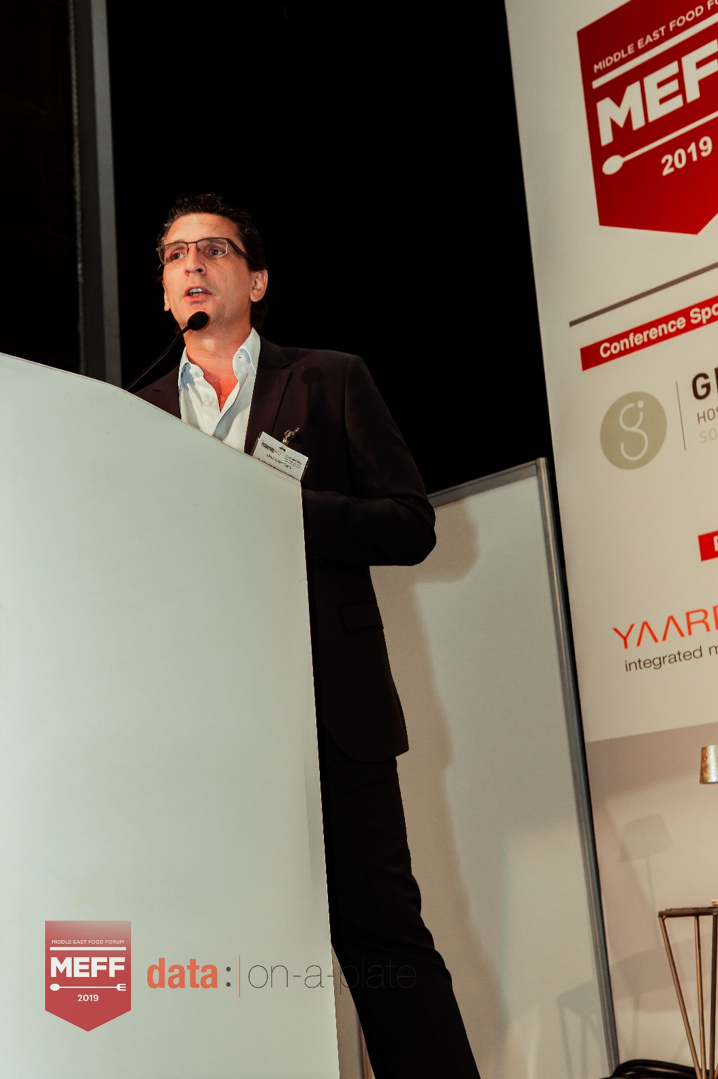
However, it’s not entirely a grim picture. These shifting market trends have given rise to new and innovative solutions for businesses to maintain their operations. One such innovation is the use of “Dark Kitchens”. A dark kitchen is an approach used by restaurants where multiple F&B brands combine their resources in order to reduce overheads and to increase their capacity to serve the food delivery market. Various restaurants can function out of the same shared dark kitchen, with the aim of catering to the delivery systems as opposed to eat-in customers.
The liveliest debate of the day was moderated by Stefan Breg, Serial Restaurant Concept Creator & Strategist, Keane Brands, Speakers included Naim Maadad, Founding Chief Executive, Gates Hospitality, Sajan Alex, VP Operations, TABLEZ Food, George Kunnappally, Managing Director, Nando’s Restaurants, Marvin Alballi Director of Restaurant and Bars, IHG. Demand vs Supply debate in UAE F&B: Over the last ten years the number of amount of restaurants in the region has doubled , however the demand for these restaurants has not grown at the same pace leading to an over saturation in the market. Growth opportunities still exist in terms of taking over existing businesses and exploring opportunities like leveraging existing infrastructure to operate multiple brands out of a singular kitchen and building communities around apps which offer loyalty programs.
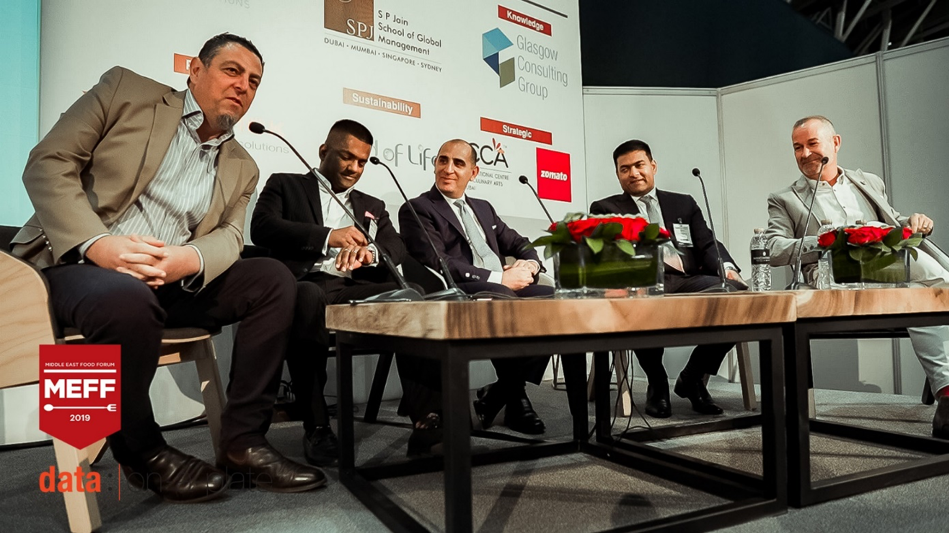
There should be a refocus on the market in order to analyse current consumer spending pattern and sustaining existing outlets rather than opening new ones. Additionally there needs to be a focus to not only increase revenue but also reduce costs by shifting to a lean supply chain in the upcoming years by optimizing the use of technology, downsizing menus, minimizing the usage of single use ingredients and looking at intelligent ways to manage the overall value chain from sourcing the ingredients all the way to serving the end product.

Some discussion around placing licensing controls and government regulations on the number of restaurants that should be allowed to open is also pertinent. Anyone with enough capital can open a café or a restaurant; however, these new establishments eat in to the customer base of existing businesses through inexpensive introductory offers. In most cases these small cafes don’t last around in the long run and by the time the consumers go back to their old eateries those business have already suffered substantial losses which begs the questions of whether there needs to be a government regulated framework in place to tackle the issue.
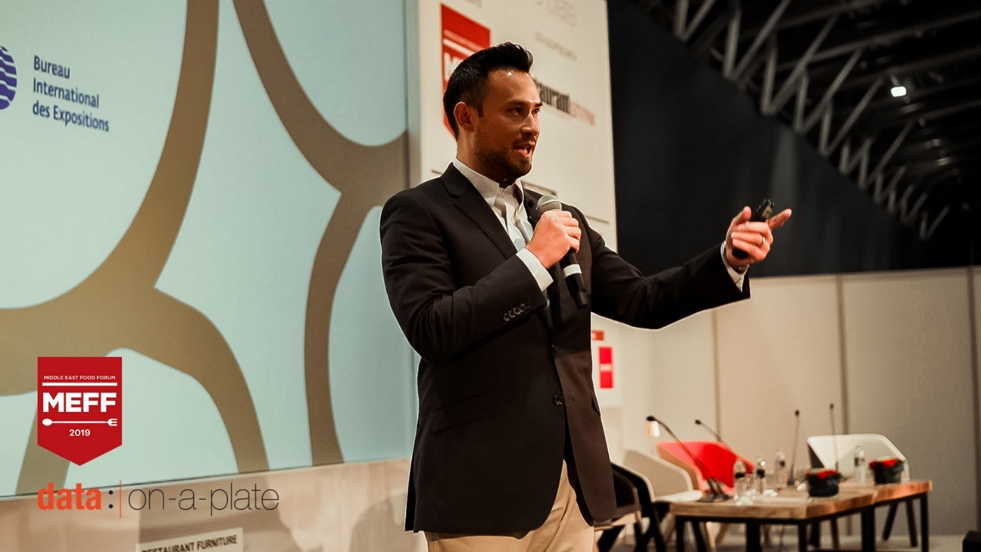
Creating a World Class Gastronomy Destination: Spotlight Keynote speaker Darren Tse outlined that with the onset of Expo 2020 it is now more important than ever to establish Dubai as an all-inclusive tourist destination which appeals to global sensibilities. With 190 countries coming together to showcase their distinguished cultures primarily through food the Expo 2020 is an excellent opportunity to celebrate culture and bring forth innovation through 50 million meal occasions from all these countries. The F&B administration at the expo has worked tirelessly to warrant the provision of an exceptional experience for exhibitors and visitors alike. In order to establish the expo as a world class gastronomic destination certain elements of design and real estate have been meticulously curated to ensure the aesthetic of the place is complementary to what people would like to see.
Those elements include having various food halls present at the venue, each offering a different experience under a different theme; show kitchens to demonstrate to and educate visitors about new and emerging culinary trends; incorporating authentic flavours from various countries so that visitors feel a touch of home in all our recipes; celebrating fusion and Emirati cuisine and to get people to have a different conversation around food by exhibiting augmented reality and futuristic dining techniques.
Financing in the F&B Sector: The second panel of the day was moderated by Naveed Dowlatshahi, CEO, Kash Global Group and the speakers are Duncan Fraser-Smith, Vice President, TFG Food and Beverage, the First Group, Omer Aslan Gurel, Co-Founder, CEO, Repeat and Nader Bassit, CEO, Wakira Investments.

Financing in the F&B sector is linked to the supply and demand. It is vital for a business to have accurate and real financial assumptions, be pragmatic and not operate based on wishful or overly optimistic plans. On the surface the F&B industry can seem cash rich and easy to operate it however it is quite a risky industry to invest in which is why it is important to build block by block bottom up plans keeping in mind the ROI and the sustainability potential of your business.
Since there is very little to account for in terms of physical assets investors of an F&B business primarily look at the operational capability and the cash flows. Additionally it works in the favour of the business if they have a unique idea backed by a compelling story and great quality which ensures repeat customers.
A lot of restaurants fail to generate repeat business which is why it is very important to evaluate each facet of your business, from finding the right location, to having the right legal systems in place and offering consumers a holistic, quality experience at sustained affordable prices.
Businesses need to be adaptable flexible in their approach and be open to incorporating change in their strategies. The greatest point of success for any business is its ability to change relevant by adapting to external changes in the market while staying true to your original business model and concept. If at any point an outlet feels like they don’t possess the resources or the ability to execute ideas despite being passionate about them, they should look towards partnering with other entities instead of being rigid and unaccommodating.
It’s important to perform a feasibility study before starting the operations for your business, it is also important to be accountable for your decisions and accept the failure of a decision instead victimizing yourself and blaming external factors such as high rentals, when in fact the truth of the matter is that no one forced you to pay such high rents, you chose to be based in a locality with rising rents.
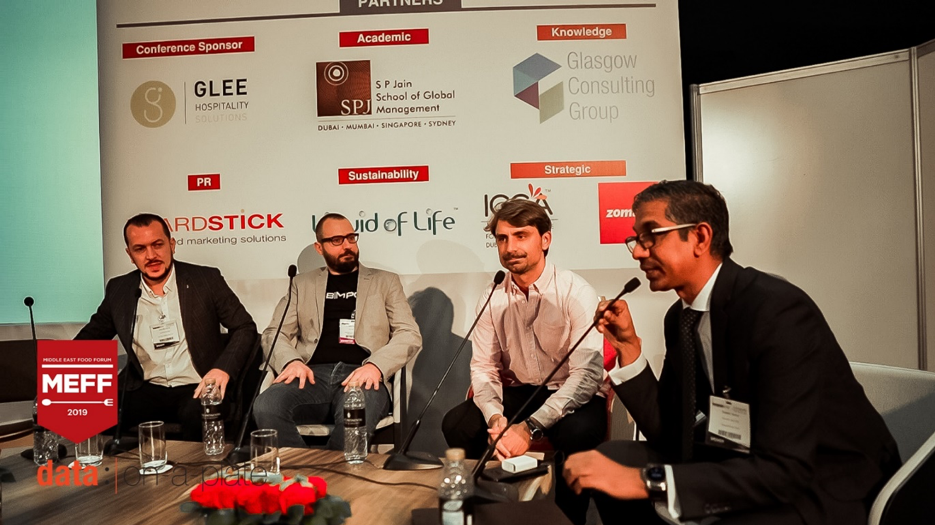
Food Tech Pitches (Foodbyte Dubai): Presentation Moderator: Sameer Sortur
Presentation from Food Tech Companies: Chatfood, IoT PLUS, BIM POS, Repeat, Nischint
Presenters: Benjamin Mouflard, Co-Founder, ChatFood, Rida Abi Farraj, General Manager, IoT Plus, Middle East LLC, John Balian, CEO, BIM POS, Omer Aslan Gurel, Co-Founder, CEO, Repeat, Raghav Mimani, Founder, CEO, Nischint
Smart Marketing and the role of Video This panel was moderated by Martin Kubler, General Manager, CEO, sps:affinity, together with the experts in Media advertising Reim El Houni, Executive Producer and CEO, Ti22 Films and dubai ON demand, Prafull Dwivedi, Director, FoodKraft International and Sajith Ansar, CEO, Founder, Idea Spice.
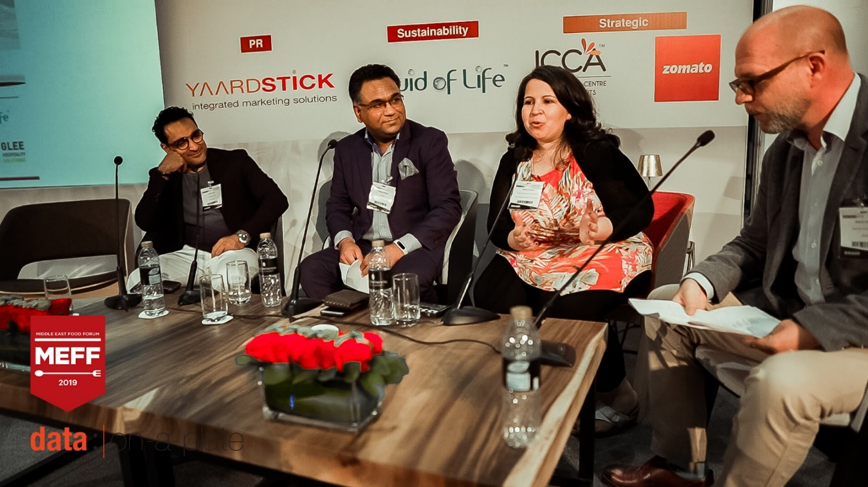
According to Mr. Prafull Dwivedi, Director of FoodKraft International, Smart Marketing refers to marketing which drives results. Smart marketing is mainly derived by smart phones and the growth of social media networks which have completely changed the process of marketing. Mr. Sajith Ansar, founder and CEO of Idea Spice further elaborates; “The idea of smart marketing in the context of an F&B outlet is to spend the least amount of money to fill the most amount of seats in your restaurant.
As per research 83% marketers are of the opinion that consumers engage more with brands in response to video content and the marketing value of 1 minute of video content is equal to 1.8 million words. Consumers have a stronger inclination towards visual content as compared to textual content. People are more alert and responsive towards three dimensional and visually appealing content as compared to static content.
Reim El Houni, Executive Producer and CEO of dubai on demand, notes on businesses fall short with their promotional strategy even with in the presence of great content. Limited promotion and sporadic uploads of video content can be detrimental to the objectives of smart marketing.
Video content can be divided in to various categories; professionally created videos, staff generated and user generated videos. Mr. Sajith Ansar points out that the most organic form of marketing. A business’s customers are its most authentic promoters and incidental videos created by them tend to generate more attraction compared to professional videos.
In order to encourage user generated content restaurants need to make their interiors aesthetically appealing and “Instagrammable” so that your décor influences people to create content. A holistic team effort drives instant results, therefore smart marketing and video marketing need to be a part of the overall strategic business plan.
Launching a Start Up – How do you transform your idea into a business? One of the most insightful discussion of the day was moderated by Karthik Ramamurthy, Regional Director & Head, IPSOS, joined by John Balian, CEO, BIM POS, Firas Alsahin, Co-Founder-Design Director 4SPACE design and Sanjay Duggal, Vice President, MENAFA, as speakers.
According to Mr. John Balian, CEO of BIM POS entrepreneurship starts with a vision, an idea about the look and feel of your business. Mr Sanjay Duggal, VP of MENAFA states entrepreneurship is when passion is combined with purpose. Entrepreneurship is often perceived as a risky undertaking, however with the new job market trends employees are becoming more dispensable than ever before which is why job security is decreasing rapidly. Even though entrepreneurship seems risky, it is in fact pre-emptive move towards the future where the conventional 9 to 5 jobs are becoming obsolete.

The underpinnings of a successful start-up are first and foremost your personality traits; which is why it is imperative for every entrepreneur to perform a self-evaluation before launching their venture, to determine their capabilities. To ensure success it is important to think big but start small, to go against conventions to develop a unique idea and go the extra mile to works towards and fight for your idea.
We live in a dynamic society where things are ever changing, making it difficult to predict long term trends, however , in order to mitigate certain risks existing trends can be incorporated in your business plan in the short run. The best way to develop a strategy is by utilizing the outside in approach as opposed to the inside out approach, this is to look at the external environment of your business, the consumer market and the prevailing culinary trends in the society and then reverse engineer them in to your business model.

The second day of the Conference started with one of the most interesting panel discussion: Food Delivery Aggregators – Spend or Incremental Revenue for an Operator? Moderated by Edward Harvey, Director, Elevate, speakers are Anurag Bajpai, Audit Partner, Head of Retail, KPMG Lower Gulf, Mohammad Al Madani, Chairman & CEO, Al Madani Group of Companies, Sayed Munaf, Business Head, Zomato and Adrian Azodi, Head of Business Development, Deliveroo.
The objective of the panel’s discussion was to determine whether food delivery systems were a cause of disruption or of adding value to existing food establishments. Food delivery services are rapidly outpacing restaurant sales and it is believed that by 2023 delivery sales will grow 3% faster than restaurant sales owing to a shift in consumer giving an exceeding preference to online ordering.
As per KPMG findings technology is disrupting the archaic way in which businesses deals with consumers and the way people eat but at the same time it creates opportunities as well by leveling the playing field for restaurants of all sizes and allowing small businesses to have access to markets that were previously inaccessible as a result of food delivery aggregators. As food operators are becoming more technology driven the emerging formula for success is for restaurant to merge good quality food with platforms like Deliveroo and Zomato.
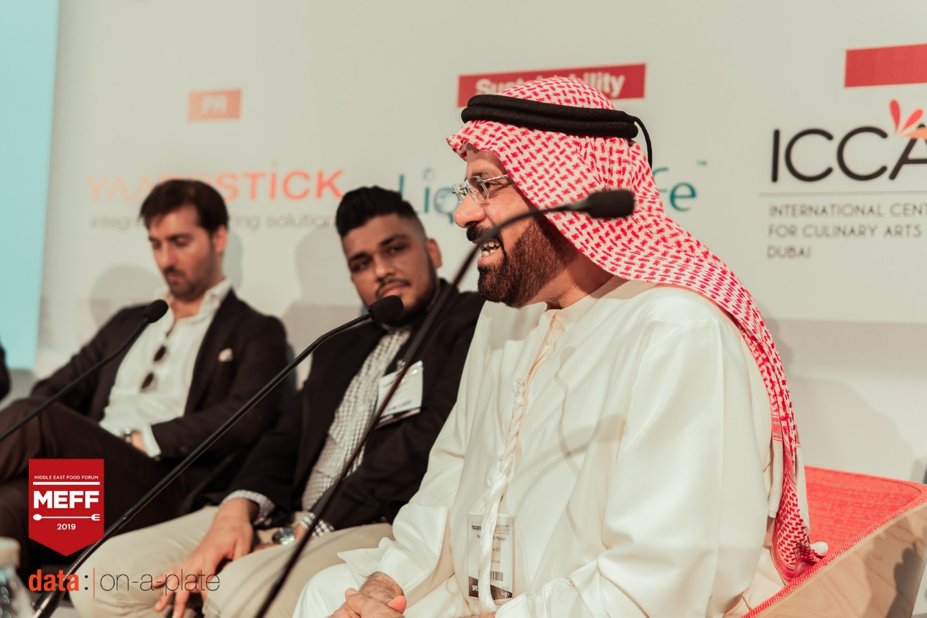
Restaurants often find it hard to understand decreasing retention rates, partnering with food delivery aggregators can help restaurant understand their retention rates as aggregators are able to provide restaurants with consumer data regarding each order. This helps restaurants identify new ideas for engineering their menus and concepts. However, only details pertinent to the order should be shared without infringing on user privacy.
The new culinary experience is shifting from “kitchen to table” to “kitchen to home”, restaurants which use aggregators only have to solely focus on preparing the food work to improve on that aspect as compared to restaurants which have to take the orders and deliver it themselves. Cost borne by restaurants such as hiring additional staff and purchasing a personal transportation fleet to execute deliveries reduce significantly when using aggregators.
Keynote speech: Digital Transformation In Food Safety Bobby Krishna, Senior Food Safety Specialist, Dubai Municipality explained that by the time food reaches your plate it has gone through several check points and food safety outbreaks are rarely traced back to the original source within a short period of time or even within a span of a month.
The way we maintain records in food establishments hasn’t changed and the paperwork is increasing exponentially. There is also issue in the form of fake documents so you cannot be sure if the food certificates you inspect are genuine and when consumers order things like organic salmon are they really receiving organic salmon?
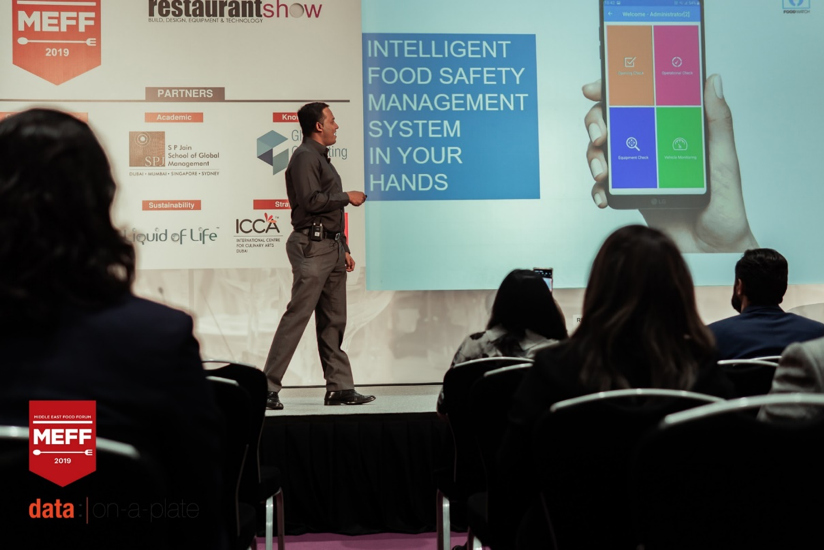
The threat of food safety system is quite complex and if you have a problem within your food supply and preparation chain the whole system gets affected and it also becomes quite difficult to pin point the exact origin of a safety issue. We usually rely on Food Safety Management Systems to trace these issues and to carry out daily process control and record keeping, equipment buying testing and maintenance, food vehicle monitoring, pest management, food supplier management, certification management and laboratory testing. Traditional food safety management systems work on the basis of food establishments managing food safety by establishing control measure for their processes. These processes are monitored manually and records of such monitoring processes are maintained in paper-based records. However, authorities have now started to think of innovative tools to change food safety management processes. A two year old digital interface called Food Watch has been introduce to manage any information regarding food including details of any food business existing in Dubai, trainings conducted, equipment used, vehicles owned and any permissions you need to obtain before participating in events.
Food Watch is an intelligent food safety management system which performs daily food safety checks, notifies and follows up with pest issues, verifies suppliers and food deliveries, conducts vehicle checks and maintains and checks food equipment.
Theatre of Cooking This panel was consisted of well-respected chef and experts in the kitchen. Moderated by Chef Bobby Kapoor, Chef Partner, Cartalyst Solutions together with Chef Nigel Lobo, Executive Chef and Group Culinary Administrator, Royal Orchid Hospitality Group, Rabih Omran, Founder, Managing Director, Rocfort Kitchens and Gabriel Estrella Talentti, Director Middle East & Africa, Alto-Shaam Inc.
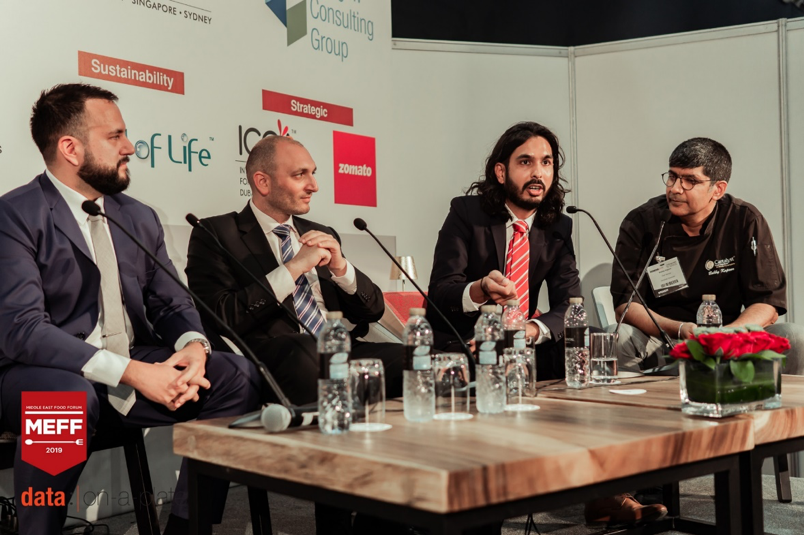
Cooking has evolved significantly with the advent of new technology. Tech is invading the culinary world. To accommodate the shift in consumer demands kitchens spaces need to get smaller while increasing the productivity of the overall cooking process. Although culinary equipment has evolved over the years the chef is still the primary figure in the kitchen and any equipment used in the kitchen is purely meant to bring his idea to life and complement his role in the kitchen. Machines have not managed to replace humans in the kitchen space yet and although machines make the overall process of cooking easier and more efficient we still require humans to operate the machinery and use it to its full potential.
We now live in the “Instant Generation” where people want to experience the restaurant even before they enter it, owing to the widespread social media that has become a stark reality. Consumers have the luxury of researching every aspect of the restaurant from its menu, décor and the points instantly which is why restaurants need to be consistent with the quality that they provide as well as focus on the aesthetics of the place. Restaurants are under constant public scrutiny at every point of the operations. 80% of consumers base their decision of trying out a new restaurant on reviews which is why chefs these days need to not only cook well but also be artists, actors and social media stars.
It is important to note the while kitchen spaces have reduced menu sizes have not changed. Additionally kitchens are not only preparing food to serve the in house customers but also for home deliveries which means chefs have to deliver a larger quantity of food in a smaller space which is why kitchen planning is of utmost importance and should be at the centre of your concept. Kitchen planning needs to be done at the start of formulating a strategy in order to ensure the achievement of commercial targets. It is quite important to work with innovative manufacturers and to include your chefs in kitchen planning as they’re the ones who will be executing the concept.
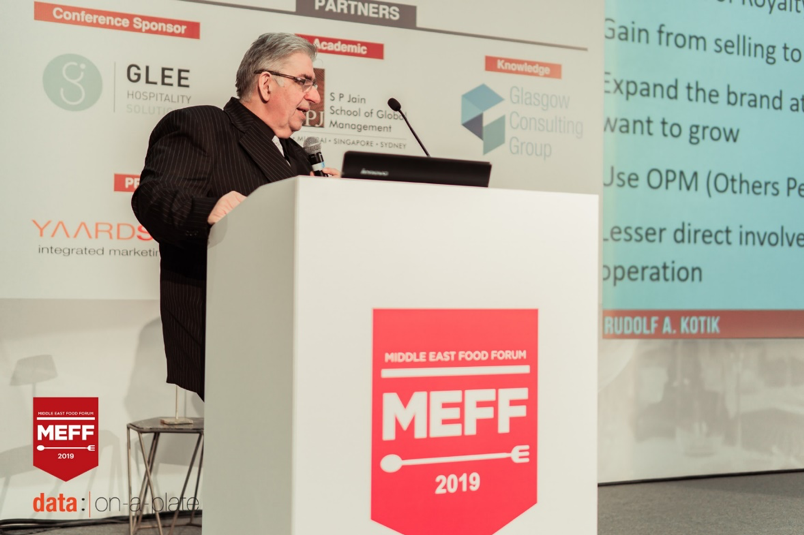
Franchising from Local to Global With almost 20 years of experience in Franchising, Mr. Rudolf Kotik, Founder and CEO, R.K. Franchise Consultancy discussed about the meticulous process of expanding a business in the UAE and Globally. From Marketing, Training and Opening assistance, Franchise Structure down to the Franchise Agreement, R.K. Franchise Consultancy will help any aspiring franchisee to make their dream in business expansion come true.
Design Thinking and Food Innovation As per Prof. Christopher Abraham, CEO, Head, Sr. Vice President, S P Jain School of Global Management, The world is moving towards innovation in terms of technology in terms of practices and process so why not in the food industry. We live in an incredibly brilliant world rife with abundant opportunities and no matter how the economic condition if the world is portrayed in the media there will always be industries like education and food which are recession proof. However, it’s how we change the rules of the game and redesign that makes all the difference.
We need to look at how to become smart with applying some of the principles of design and innovation to see how we can reinvent the concept of food and what the future of food holds for us. The forces shaping the food industry are; big foods coming under pressure due to local opportunities, activist investors which talk about the sustainability and ethical implications of sourcing food, low cost of capital and the digital disruption.
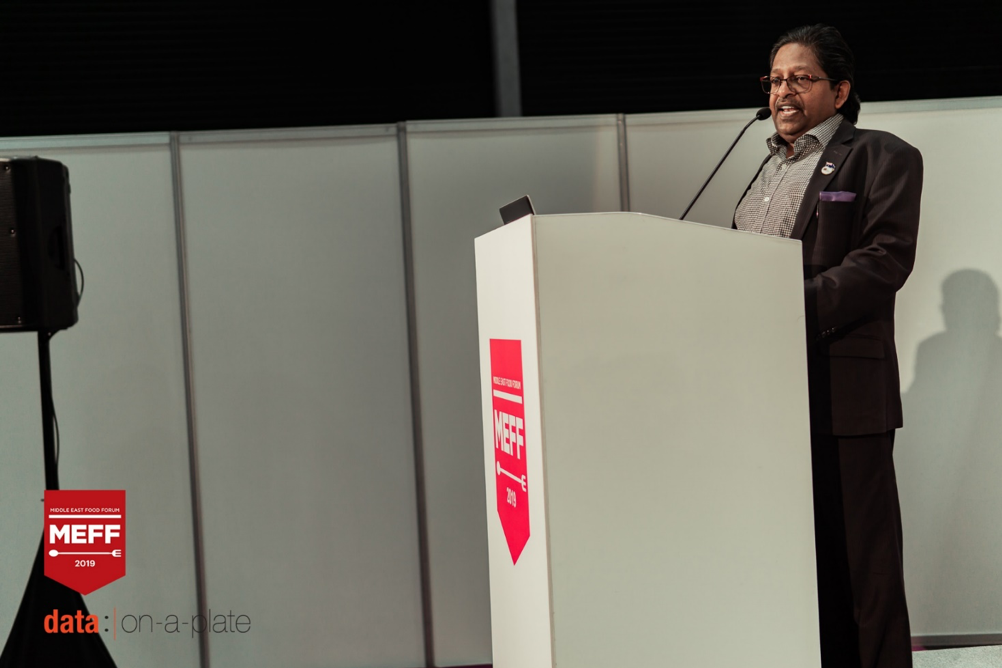
The future of food is changing in three ways; the way we eat, how we shop for food and how we engage in the whole concept of consuming food and sharing it with others. The way we shop food has drastically changed thanks to technology. Earlier we would have to go to wholesalers now we can order ingredients from all over the world. We also have a wide array of choices which have changed the way we engage with food owing to the multiple devices that help us in sharing our experiences with food. This brings us to the need for bringing an element of innovation using the concept of design thinking. Design thinking is a human centered approach to problem solving and helps us get a deeper understanding of customers’ unmet needs and wants and encourages creative considerations of a wide array of innovative solutions.
There is a whole paradigm shift in the way we perceive food so we call it seeds of disruption. The disruptions happens across five levels; intensification which looks at newer ways of managing food resources, efficiency which focuses on reducing to save, conserve and redistribute food wastage, standardization which looks at introducing robust systems and processes, centralization which looks at the need to move to a decentralized system and convenience in terms of availability of food anytime, anywhere and any place. Each of these levels has their own ramifications as to how food should be consumed.
When and how do Food Trucks Make Money: Food trucks first appeared in the UAE F&B scene around a decade ago and ever since then people have been enamored with the idea of owning and experiencing food trucks.
What are the key ingredients which make a food truck business sustainable?
The major elements which make any business whether it be a small grocery market or a food truck is the service of its managers; including the service of the general manager, operations manager, finance manager, HR and the purchase manager. If you have the right purchaser you have the right product, whether you have a small staff or hundreds of employees you require an efficient HR manager to deal with the employees, the absence of any of these elements can cause harm to the sustainability of the business. A food truck is a small business so many investors don’t give importance to these elements however it is important for them to outsource, freelance or partner with hospitality management companies to learn to master the management of these elements.
Angelina Stoimenova, deputy head of division Binghatti Group, maintains the idea that owning a singular food truck can be sustainable provided the right location is scouted and an appropriate brand strategy is carried out by partnering with suppliers who provide products at viable costs.
However Mr. Harsh Bhatia, founder of C’est Cheese had an opposing view which states having one food truck might not be sustainable in the long run as a food truck is a seasonal business and given the region’s climate it is not possible to utilize the food truck to its full potential all year round.

There are always ways to get around the 4 to 5 months of a harsh weather conditions and earn decent revenue during that period. Choosing the correct location during this period is essential. Places such as waterparks, petrol stations, tourist destinations and residential and commercial areas can be ideal locations during the summer. It is also important to look in to expanding in to other emirates besides the Dubai and the capital, Abu Dhabi; you would be surprised at the potential of success for food trucks in these regions.
As with any other business there is a learning curve which exists with operating a food truck. To be successful in the food truck business the first and foremost requirement is to have the basic qualities of hard work, organization, passion and attention to detail. A mandatory feasible check needs to be carried out before starting to think about a concept for your food truck. A sound knowledge of the market lends a huge advantage is the longevity and sustainability of any business.
Mr. Kris Haggie, founder and CEO of Truck-A-Licious urges investors to have patience while building a brand with your food truck. It is very important to provide consumers with affordable price points paired with good quality food as people come for the experience but stay and return for the quality. It is also quite important to find a knowledgeable fabricator to guide you through the process.
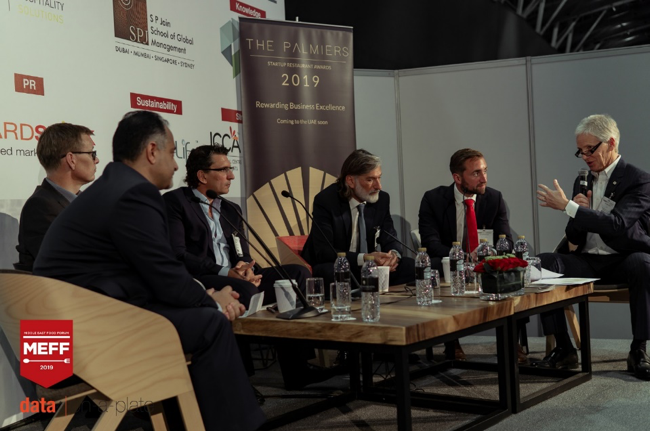
Identifying opportunities in the F&B market and where to invest The third and last day of the conference started with a Bang! Moderator David Macadam, CEO, The Middle East Council of Shopping Centres, got the ball rolling by asking interesting questions to the brilliant panelists. The discussion revolved around the current market situation, the opportunities and the challenges of every business owners in the F&B. According to Mr. Aboudi Saadi, there is a higher rate of failure now compared to 5 years ago. So it is really important to know the answers to some critical questions beforehand such as where to invest? Why are you investing? Do you know how much to invest? James Le Gassick also shared his take on the importance of the site location as a good site now might not be a good location in the next couple of years. Mr. Ramzy Abdul Majeed, FCA, Founder, Whissle, agreed to Aboudi that the Entrepreneurs who are likely to fail are those who have unrealistic payback expectations. Mr. Daniel During, Owner, Thomas Klein International also pointed out that oversupply may be the reason why some business fails.
David Richardson, Head of Leasing at Nakheel said they now try to be more flexible working with their tenants and reacting to the change in the market. While Intelligent Foods, according to Mr. James Le Gassick CEO, MoRE Café / Intelligent Foods, tries to be more innovative with their products.
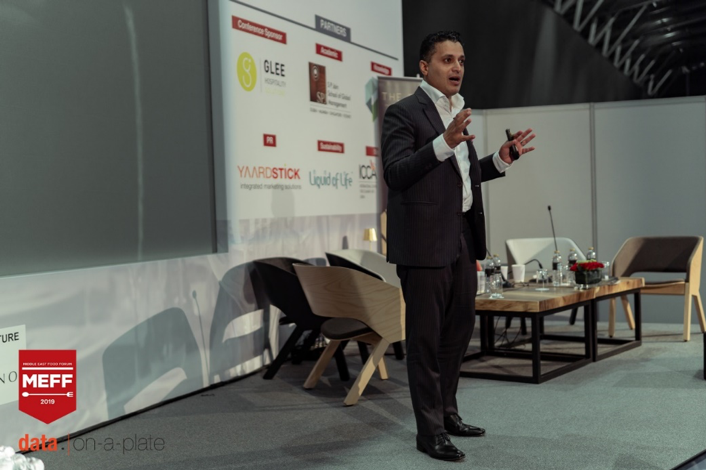
F&B Celebrate Your Failures Mr. Rohit Bassi, Founder, ROI talks discussed about the importance of having the attitude of gratitude. He also quoted from the book ‘The Art of Happiness’ by the Dalai Lama & Howard C. Cutler: ‘In order to gain success there is a sweet emotion which you can give yourself and to the people around you: LOVE.’ He said that if you really want your business to succeed, you need to get into a state of compassion.
Learning and Development in F&B – Emerging & Effective Ways Panel Moderator: Sunjeh Raja, CEO, ICCA – International Centre for Culinary Arts, Dubai, Speakers: Khaled Bani Amer, Director of Human Resources, Movenpick Hotels & Resorts, Chef Mauro Gomez, VP Global Operations, Richard Sandoval Restaurants, Shagufta Patel, People Development Specialist, ICCA, Anubha Khandelwal, Certified Hospitality Educator, Training Manager, the Oberoi Group, Chef Uwe Micheel, Culinary Adviser, Radisson Blu Hotel.
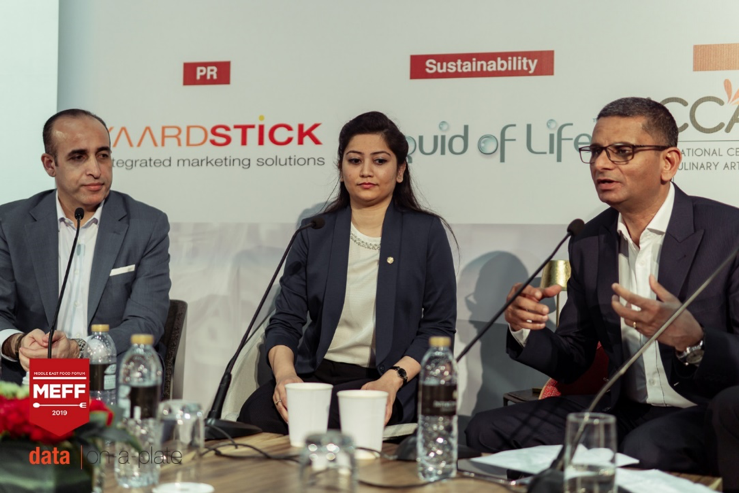
Ms. Shagufta Patel, People Development Specialist, ICCA said that before- the people who enter the kitchen are people who are passionate about food or those who are not academically inclined. According to her, things have changed with the growth and evolution in the F&B and hospitality, being a chef now appears to be a glamorous profession.
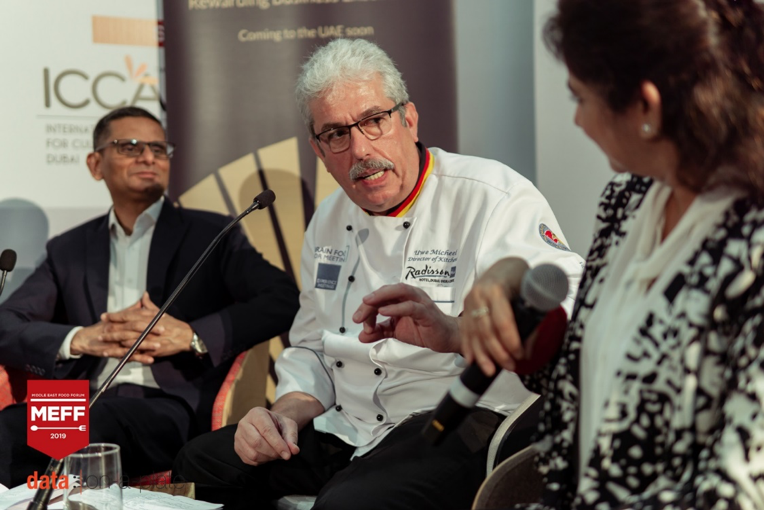
As more and more millennials are joining the F&B industry, they discussed about the innovation in the way they teach the budding chefs. It is important to have skills in the kitchen however, the panel agreed that human interaction such as better customer service and people management are what makes clients go back to their hotels.

Women Leaders in F&B Panel Moderator: Dina Abdou, Head of Global Sales, Foodics Speakers: Emma Banks, Vice President, F&B Strategy Development, EMEA Hilton Group, Rukhsana Kausar, Founding Partner, Liquid of Life, Ekaterina Starodubsteva, Owner, CEO, HURMA Recruitment, Dana Al Sharif Founder, Urban RetrEAT.
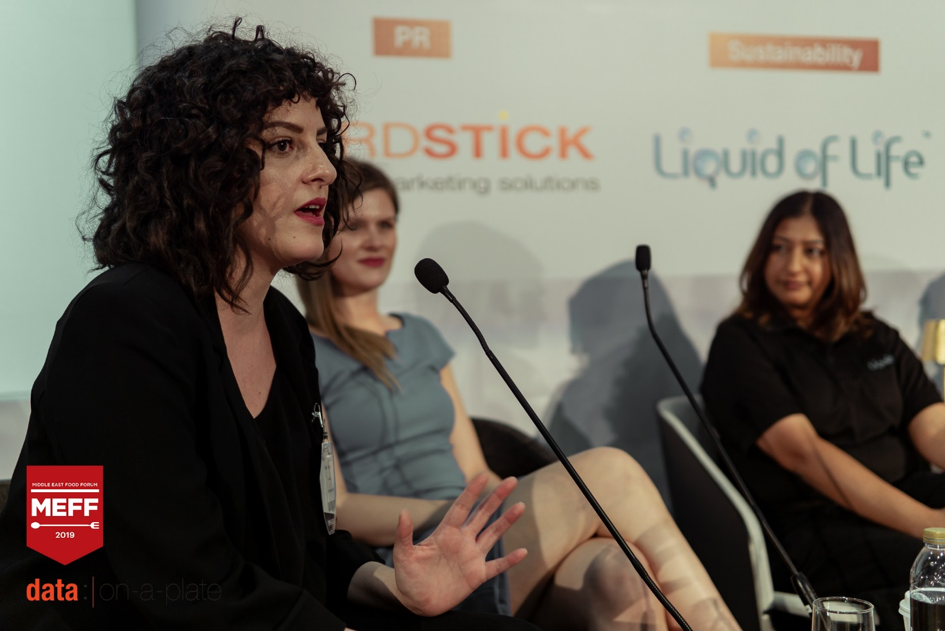
Each speaker shared their experiences in the past when they have to deal with inequality and discrimination at work. Emma Banks Vice President, F&B Strategy Development, EMEA Hilton Group talked about the significant rise of women in F&B now compared to when she was just starting. Rukhsana Kausar, Founding Partner, Liquid of Life also expresses her pride in the women in their field.

Social Media Marketing – Influencer Licensing & Ethics Interestingly, this panel was equally divided between a group of influencers and business owners. Moderated by Anishkaa Gehani, Founder & CEO, Yardstick Marketing Management, Social influencer Courtney Brandt, Founder, A to Za’atar, Elena Weber, Founder, Managing Director, ICONS Coffee Couture, Peggy Li, Managing Partner, sps : affinity.

Each of them shared their unfiltered takes and views on paid advertisement, fake online ratings and unbiased reviews. As per Courtney Brandt, Founder, A to Za’atar said ‘You can still be unbiased (on your review) whether you’re paying or not paying. – The reason you’re there is to give your own feedback.’









